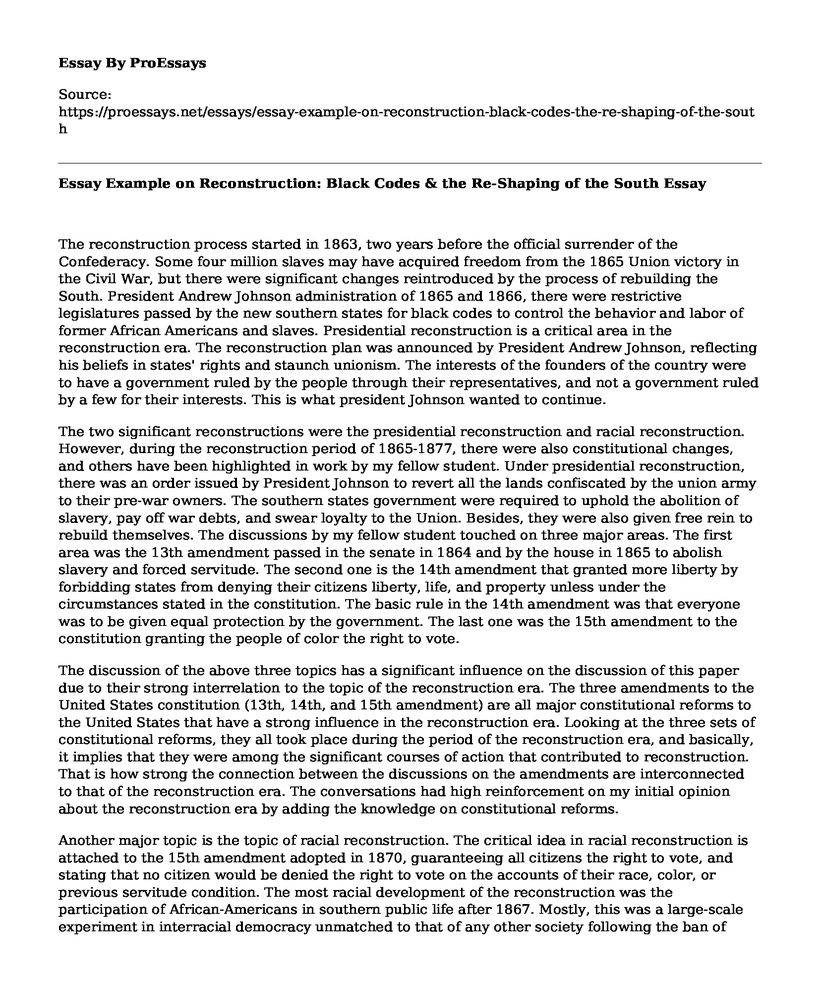The reconstruction process started in 1863, two years before the official surrender of the Confederacy. Some four million slaves may have acquired freedom from the 1865 Union victory in the Civil War, but there were significant changes reintroduced by the process of rebuilding the South. President Andrew Johnson administration of 1865 and 1866, there were restrictive legislatures passed by the new southern states for black codes to control the behavior and labor of former African Americans and slaves. Presidential reconstruction is a critical area in the reconstruction era. The reconstruction plan was announced by President Andrew Johnson, reflecting his beliefs in states' rights and staunch unionism. The interests of the founders of the country were to have a government ruled by the people through their representatives, and not a government ruled by a few for their interests. This is what president Johnson wanted to continue.
The two significant reconstructions were the presidential reconstruction and racial reconstruction. However, during the reconstruction period of 1865-1877, there were also constitutional changes, and others have been highlighted in work by my fellow student. Under presidential reconstruction, there was an order issued by President Johnson to revert all the lands confiscated by the union army to their pre-war owners. The southern states government were required to uphold the abolition of slavery, pay off war debts, and swear loyalty to the Union. Besides, they were also given free rein to rebuild themselves. The discussions by my fellow student touched on three major areas. The first area was the 13th amendment passed in the senate in 1864 and by the house in 1865 to abolish slavery and forced servitude. The second one is the 14th amendment that granted more liberty by forbidding states from denying their citizens liberty, life, and property unless under the circumstances stated in the constitution. The basic rule in the 14th amendment was that everyone was to be given equal protection by the government. The last one was the 15th amendment to the constitution granting the people of color the right to vote.
The discussion of the above three topics has a significant influence on the discussion of this paper due to their strong interrelation to the topic of the reconstruction era. The three amendments to the United States constitution (13th, 14th, and 15th amendment) are all major constitutional reforms to the United States that have a strong influence in the reconstruction era. Looking at the three sets of constitutional reforms, they all took place during the period of the reconstruction era, and basically, it implies that they were among the significant courses of action that contributed to reconstruction. That is how strong the connection between the discussions on the amendments are interconnected to that of the reconstruction era. The conversations had high reinforcement on my initial opinion about the reconstruction era by adding the knowledge on constitutional reforms.
Another major topic is the topic of racial reconstruction. The critical idea in racial reconstruction is attached to the 15th amendment adopted in 1870, guaranteeing all citizens the right to vote, and stating that no citizen would be denied the right to vote on the accounts of their race, color, or previous servitude condition. The most racial development of the reconstruction was the participation of African-Americans in southern public life after 1867. Mostly, this was a large-scale experiment in interracial democracy unmatched to that of any other society following the ban of slavery. During this period, elections to the southern state governments and even to the United States Congress were won by blacks. Reconstruction brought many achievements and among them included the introduction of the state-funded public school system in the South for the first time, laws against racial discrimination in accommodations and public transport, more equitable tax, and the ambiguous economic development programs that included the aid to railroads and other ventures.
Conclusion
Inline to the current controversies on the executive and the legislative branches, I think that there are no much variances in how things have been conducted in the past and how they are conducted now. The executive is still in charge of carrying out and executing laws, and it also remains to be the branch with less power. On the other hand, the judicial branch, made up of the Congress and the House, interprets laws and prohibits the breaking of the law by those that made it. However, there are some slight variances with regards to the powers of the president. Unlike Andrew Johnson's case where he goes impeached for passing laws that were not appealing, the current-day United States president has exercised excess authority by introducing the ban on immigration and using excessive orders to create authority. This is not in line with the objectives of the creators of the constitution. Like stated in the beginning, they aimed to form a government where the people govern themselves through their representatives, and not a few individuals are working for their interests. The reconstruction era achieved many benefits to the native-born Americans as well as the colored Americans, and the benefits should be life-long.
Cite this page
Essay Example on Reconstruction: Black Codes & the Re-Shaping of the South. (2023, Feb 09). Retrieved from https://proessays.net/essays/essay-example-on-reconstruction-black-codes-the-re-shaping-of-the-south
If you are the original author of this essay and no longer wish to have it published on the ProEssays website, please click below to request its removal:
- Example of Articles Review on Syria and Iraq Conflict
- Cyrus the Great and the Cyrus Cylinder Essay
- Pablo Picasso's Biography abd Self-Portrait With Palette Essay
- Medea the Play Essay Example
- Essay Sample on History of Long Island
- Essay on Dr. James Lind: From Grammar School to Medical Pioneer
- Essay Example on Aeneid: Examining Roman Identity, Gender Roles & Assimilation







